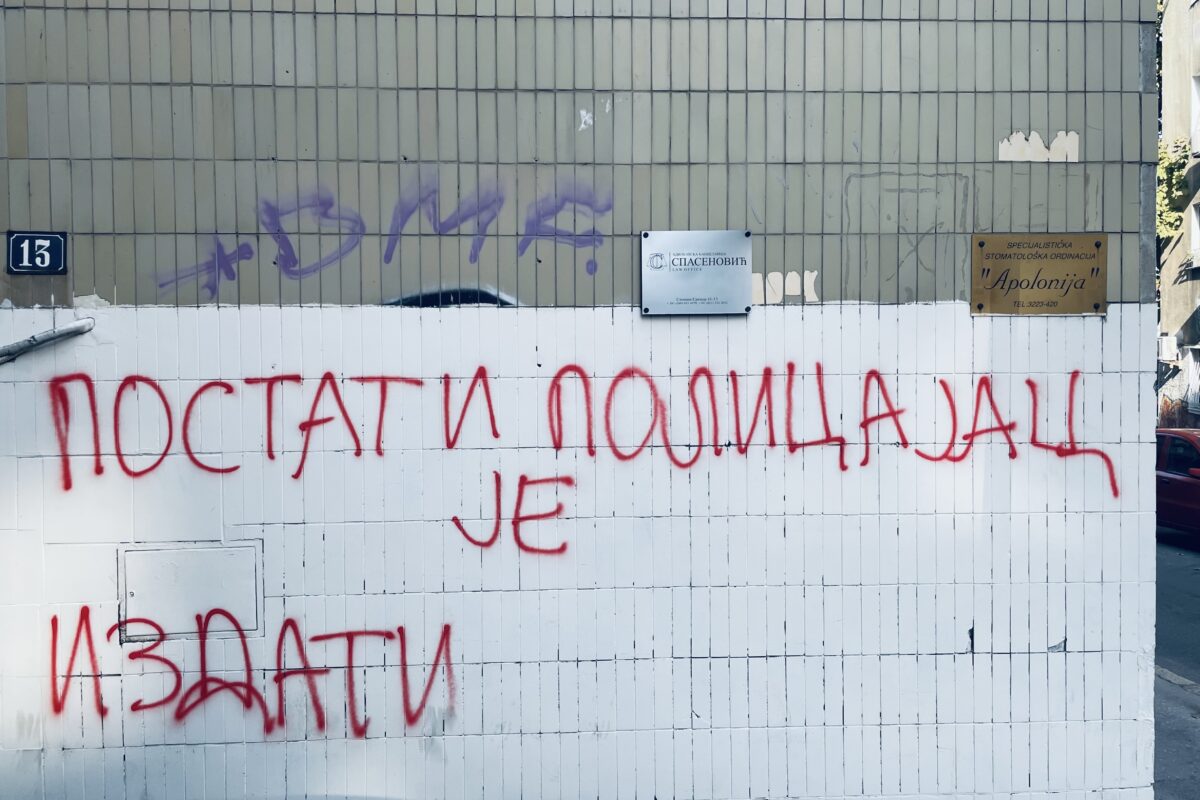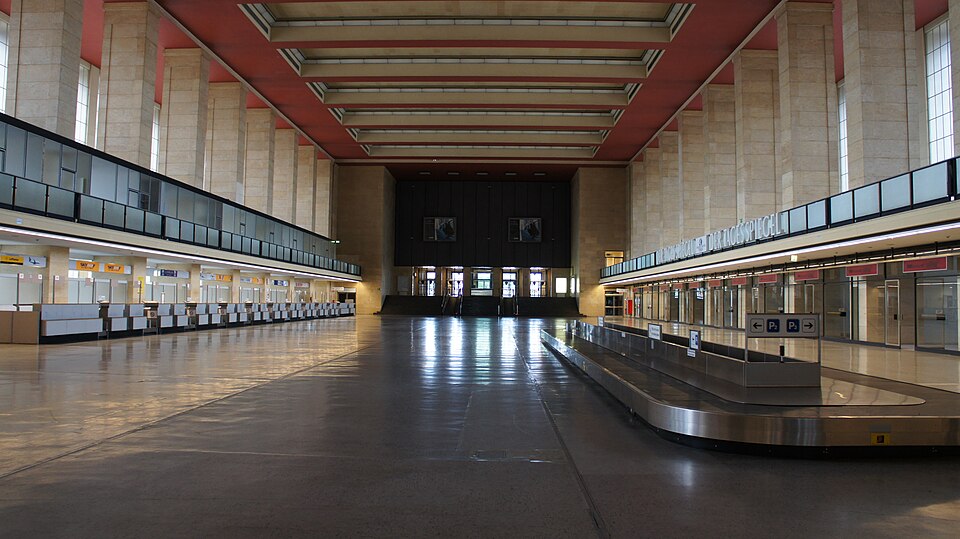In early September, Die Linke leader Heidi Reichinnek made headlines after claiming her party’s vision of “democratic socialism” had nothing to do with the German Democratic Republic (GDR): “What we had in the GDR wasn’t socialism. At least not the kind my party envisions.” Germany’s conservatives soon jumped in to disagree: “The GDR was pure socialism. It was an unjust state.” Rather than counter this narrative, Nathaniel Flakin recently wrote an article which—though critical of her party’s programme of “democratic socialism”—agrees with Reichinnek’s assessment of the GDR. According to Flakin, “a society can only be described as socialist if it meets Marx’s criteria of evolving towards the abolition of classes and the state” and the GDR “did anything but wither [away].”
Underlying both Reichinnek’s and Flakin’s arguments are the anti-GDR talking points that have long been propagated in the Federal Republic of Germany (formerly “West Germany”). The GDR is said to have been thoroughly undemocratic or, as Flakin puts it, a “Stalinist state” ruled by a “privileged bureaucracy, obsessed with control.” The lack of democracy and “suppression of all criticism” was not only “an insult to human dignity”, it also “produced constant inefficiencies” and prevented “good planning.” The GDR is presented as a caricature of bumbling, self-enriching bureaucrats who could only uphold their ailing system through mass surveillance. Rather than being a point of reference that progressives can learn from, the GDR should be written off as nothing more than a “footnote of history” (Stefan Heym). Reichinnek and Flakin assure us that their versions of socialism will be different.
Decontextualization and distortion
Such arguments against the GDR follow a similar pattern. First, a real and concrete problem in the GDR is identified. It is then taken out of its historical context and greatly exaggerated, before being generalized as a core, indefinite characteristic of the “Stalinist state.” Historical developments are distorted and decontextualized to create the impression that the GDR was broken and chronically ailing society. Flakin does exactly this when describing the East German economy. It is indeed true that the GDR faced significant challenges such as raising labour productivity or finding an adequate mechanism for price setting in the planned economy. However, blanket statements about “constant inefficiencies” are simply inaccurate and misleading.
The GDR economy proved itself to be robust and efficient over its 40-year existence. From 1949 until 1989, not a single year of stagnation or recession was recorded. In fact, in a paper published by Professor Gerhard Heske in 2009, East Germany’s annual growth rate (4.5%) is shown to have exceeded West Germany’s (4.3%) during the era of socialist planning (1951 to 1989). Data on the production and consumption of consumer goods confirms that the GDR was able to achieve the official objective of “meeting the growing material and cultural needs of the population” and thus progressively improving living standards.
Detractors of the GDR invariably ignore the context in which this socialist state operated. Since Germany’s heavy industries had historically been concentrated in the western regions of the country and due to the heavy damage inflicted on eastern Germany during the end phase of the Second World War, the GDR was compelled to construct large-scale industries from scratch in the late 1940s. The means of investment for this endeavour had to be accumulated internally, for East Germany possessed neither overseas colonies nor foreign benefactors (in contrast to West Germany, which received massive capital inflows through the Marshall Plan). The GDR alone had to rectify the damage inflicted by Hitler’s war after the Western powers violated the Potsdam Agreement and suspended reparation payments to the Soviet Union in 1946. Western sanctions also meant that trade with the resource-rich Ruhr Area in the West was no longer possible. All in all, seventy percent of East Germany’s pre-war industrial capacity was no longer available after 1945, which meant that living standards and productivity in the East were only nearly half of what they were in the West.
Through the resolute effort of millions of workers and through the efficient socialist planning system, the GDR was able to increase the volume of investment more than three-fold during the decade of socialist construction in the 1950s. By 1989, industrial production had increased by a factor of 12.3, and the gross domestic product had quintupled. These achievements were made possible by socialist property relations and the scientifically grounded planning process: far from being syphoned off and consumed by an exploitative “privileged bureaucracy,” the GDR’s surplus product was accumulated in the public hand and consciously reinvested to accelerate industrialization and economic development. The intricate planning system was structured around the Leninist principle of democratic centralism: economists and planning specialists collected data and analysed international and technological developments to draft perspective plans for the GDR’s economy. Workers and mass organizations then collectively discussed and amended these plans at the factory and neighbourhood levels. These plans thus combined complex expertise with democratic legitimacy.
Flakin withholds the title of socialism from the GDR because it failed to fulfil Leon Trotsky’s pronouncement that “socialism must increase human productivity, or it has no historical justification.” Here again, Flakin not only ignores the disadvantageous starting conditions in East Germany, but he also distorts reality. The GDR was in fact able to achieve a permanent increase in labour productivity throughout its existence. Even during the 1970s, when foreign trade was greatly affected by global energy crises and the GDR struggled to balance domestic accumulation and consumption rates, labour productivity continued to rise, albeit at slower rates than in previous decades. Many factors contributed to this trend, including the serious shortage of workers (meaning that existing production capacities could not be maximally utilised) and the political decision to prioritize consumer goods over industrial investments after 1971. These factors did not, however, alter the socialist nature of the GDR. It would be prudent to learn from the challenges that previous socialist states faced rather than brush them aside with the claim that “next time will be different.”
It is important to emphasize that the aforementioned economic problems did not lead to the “collapse” of GDR. Despite unsettled questions around pricing policies, labour productivity, and accumulation rates, the GDR was able to meet its domestic and international obligations and pay all wages until its final days of existence. The infamous accusations of bankruptcy are part of the narrative that seeks to discredit socialist planned economies: in 1989, East Germany’s debt-to-GDP ratio (roughly 19 percent) was less than half of West Germany’s (42 percent). In truth, the GDR was able to fundamentally change the face of the formerly underdeveloped agricultural region of East Germany and—in the span of just 40 years—propel the country into the ranks of the top fifteen industrialised states in the world.
Undemocratic socialism?
Flakin and Reichinnek may disagree on Die Linke’s vision of “democratic socialism”, but they do agree on one thing: the GDR was certainly not democratic. This conclusion is easy to reach if one measures the GDR by the standards of bourgeois constitutionality: the separation of powers, the protection of private property, and equality before the law. Marxists have long argued that these principles were created by and for the capitalist class. Private property necessarily curtails democracy and limits popular rule over significant sectors of society. In a society divided into poor and rich, de jure equality can only lead to de facto inequality. Recognizing this reality, communists and social democrats in East Germany never sought to establish the GDR as a bourgeois constitutional state. They aimed to construct a fundamentally different type of democracy in which public ownership over the means of production would be enshrined in law and developed further by the people. The planning system was a core element of this idea: planning was understood as a social relation in which the people were to become increasingly active and conscious of their role as co-creators of society. Democracy was thus conceived of as a process, a continuous task to be deepened throughout the course of socialism.
The foundation for the GDR’s socialist democracy was laid during the so-called “anti-fascist upheaval” of the late 1940s. The East German economy was radically democratized through a land reform that redistributed the aristocrats’ lands to the peasants and the expropriation of industrial monopolists, which led to the creation of Volkseigene Betriebe (“companies owned by the people”). Economic power was thereby devolved to the working masses. Far from being bureaucratic policies from above, these measures were carried out by the people themselves. The Soviet military administration made a point to entrust the German people with the task of identifying and investigating which companies and estates should be marked for expropriation. Tens of thousands of workers and peasants joined so-called Sequester Commissions and Land Reform Commissions to collectively scrutinize their employers’ participation in Hitler’s Third Reich. Suddenly, workers and landless farmers found themselves entitled to investigate secret business records and uncover the connection between capitalism and fascism. In West Germany, on the other hand, popular efforts to socialize industries and banks were quashed by the authorities, despite democratic referenda on the issue. The “anti-fascist upheaval” of the late 1940s and “socialist construction” of the 1950s were profoundly democratic in both content and form. The claim that such major social feats were achieved through oppression and coercion is nonsensical.
Flakin claims that the GDR “suppressed all criticism.” In countless interviews with former GDR citizens, we heard otherwise. The factory and neighbourhood committees were in fact places of heated and controversial debate. Whereas in capitalism, democracy stops as soon as you enter the workplace, democracy in the GDR began behind the door of the factory or office. As a “workers’ and peasants’ state”, the GDR guaranteed employees the right to participate in factory management as well as a long list of social rights such as health and childcare, company holiday resorts, and further education. Many of these rights were laid out in the Labour Law, which was passed in 1961 after some 7 million citizens discussed and suggested over 23,000 amendments to the original draft. These laws authorized the workers themselves to monitor company directors and ensure adherence to health protections and workplace democracy. Company directors did not own the factories and could not enrich themselves off the backs of the workers; they were de facto employees of the state and merely charged with the supervision of public property. Workers who felt mistreated could complain through their union or the popular Eingabensystem (“system of appeal”), which guaranteed citizens the right to a response within four weeks. The extension of democracy into the economy also impacted the countryside, where the creation of cooperative structures helped to not only democratize decision-making processes, but also offered farmers and peasants the previously unknown benefits of paid holidays, childcare, and cultural activities.
In the GDR, all areas of society were to be democratized by drawing the masses into everyday governing. Citizens had the right—and the means—to participate in decisions not only regarding the workplace, but also the education of children, the distribution of housing, the development of the neighbourhood, and legal mediation. A pioneering aspect of socialist democracy was the mass organisations, including the Free German Trade Union Federation, the Peasants Mutual Aid Association, the Democratic Women’s League of Germany, the Cultural Association of the GDR, and the Free German Youth. These organisations were connected and interwoven with all areas of society to ensure representation for different groups. The Women’s League, for example, was guaranteed representation in residential committees, schools, cultural centers, and parliament, where it helped advance women’s economic emancipation from men. In contrast to the unions and organizations in capitalist societies, the GDR’s mass organizations were not fragmented and treated as private lobby groups; they were political organizations empowered by the state to encourage the collective deliberation and implementation of socialist policies.
The judiciary, which in capitalist societies is typically far-removed from popular will, was also democratized in the GDR. So-called societal courts were set up in workplaces and residential areas to address conflicts and problems in direct and relatable ways. Members of the courts consisted of one’s peers, for they were elected by the people directly. Workers, teachers, scientists, craftsmen, and artists were all practicing law to help settle issues. Through the courts, the mass organizations, and the Eingabensystem, GDR citizens had many ways to bring about concrete changes in their everyday lives.
Recognizing these institutions as innovations of socialist democracy in no way precludes critical appraisal. It is clear when assessing GDR history that while certain periods were marked by rapid advances, others were characterized by stagnation. The latter phases should be analyzed in their historical context if we are to learn anything from them. It cannot be forgotten that the GDR was located on the frontline of the “Cold War,” with West German leaders openly declaring the intention “to do everything and to take every measure to retake [East Germany].” Nevertheless, socialist democracy is an evolving process in which citizens must increasingly recognize and use the means of production and the instruments of democracy as their own. This requires the consistent use and further development of established institutions. In the GDR, there are clear signs that this process slowed down towards the 1980s. But, again, such developments did not change the socialist character of the GDR. Rather, they point us to a problem that all post-capitalist states have faced in the past: how can revolutionary momentum be maintained in the long run to ensure that social relations continue to evolve? It is especially difficult when this necessity to open up institutions and broaden democracy comes into tension with the need to defend against counterrevolution and external threats. The GDR was by no means the only socialist state to face this challenge of balancing democracy with security, and it would be naïve to believe that future attempts to construct socialism will be free of it. As Lenin wrote in 1920: “The proletariat’s conquest of political power does not put a stop to its class struggle against the bourgeoisie; on the contrary, it renders that struggle most widespread, intense, and ruthless.” Praxis—not abstract speculation—is the criterion of truth. The idea that the state will immediately begin withering away under “true socialism” is a regression to the utopianism Marx and Engels criticized so sharply in their time. Instead of kow-towing to the ruling narrative and disowning the GDR, we must uphold it as Germany’s first socialist state. The collective efforts of millions of GDR citizens have given us four decades of praxis to learn from. By reclaiming this history as our own and investigating it on our own terms, we can gain a deeper perspective on the fundamental possibilities and difficulties that arise when constructing social, economic, and political models beyond capitalism.




